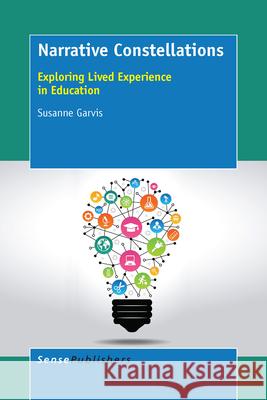Narrative Constellations » książka
Narrative Constellations
ISBN-13: 9789463001496 / Angielski / Miękka / 2015 / 98 str.
Narrative Constellations
ISBN-13: 9789463001496 / Angielski / Miękka / 2015 / 98 str.
(netto: 178,90 VAT: 5%)
Najniższa cena z 30 dni: 179,73
ok. 22 dni roboczych.
Darmowa dostawa!
Narrative research in contemporary times can free social scientists from the rhetorical forms (Emihovich, 1995) that alienate children and families from their own traditions. Through the use of narrative we are able to recognise the power of subjectivity in allowing open dialogue and co-construction of meaning. Becoming comfortable with narrative research also means accepting ideas that the world has no fixed rules for assigning behaviour (Emihovich, 1995). This means that open dialogue is required to build consensus around shared meaning and to ensure the inclusion of multiple voices. The book begins with a theoretical overview of narrative genre before focusing on narrative constellations. Three constellations are then shared with the reader. The final chapter provides ideas about the future of narrative constellation in research and the impact constellations can have for future policy and practice. It is hoped that the reader develops a better understanding of narrative ways and begins to see the potential of narrative constellations in the research genre. Dr Susanne Garvis is a professor of child and youth studies at the University of Gothenburg, Sweden. She has previously worked in Australian universities and is an adjunct academic with Griffith University, Australia. Professor Garvis has experience with narrative approaches in early childhood education and care. She has researched the lives of teachers, families and children. She is particularly interested in representations of lived experience and the power of stories in research.
Narrative research in contemporary times can free social scientists from the rhetorical forms (Emihovich, 1995) that alienate children and families from their own traditions. Through the use of narrative we are able to recognise the power of subjectivity in allowing open dialogue and co-construction of meaning. Becoming comfortable with narrative research also means accepting ideas that the world has no fixed rules for assigning behaviour (Emihovich, 1995). This means that open dialogue is required to build consensus around shared meaning and to ensure the inclusion of multiple voices.The book begins with a theoretical overview of narrative genre before focusing on narrative constellations. Three constellations are then shared with the reader. The final chapter provides ideas about the future of narrative constellation in research and the impact constellations can have for future policy and practice. It is hoped that the reader develops a better understanding of narrative ways and begins to see the potential of narrative constellations in the research genre. Dr Susanne Garvis is a professor of child and youth studies at the University of Gothenburg, Sweden. She has previously worked in Australian universities and is an adjunct academic with Griffith University, Australia. Professor Garvis has experience with narrative approaches in early childhood education and care. She has researched the lives of teachers, families and children. She is particularly interested in representations of lived experience and the power of stories in research.











